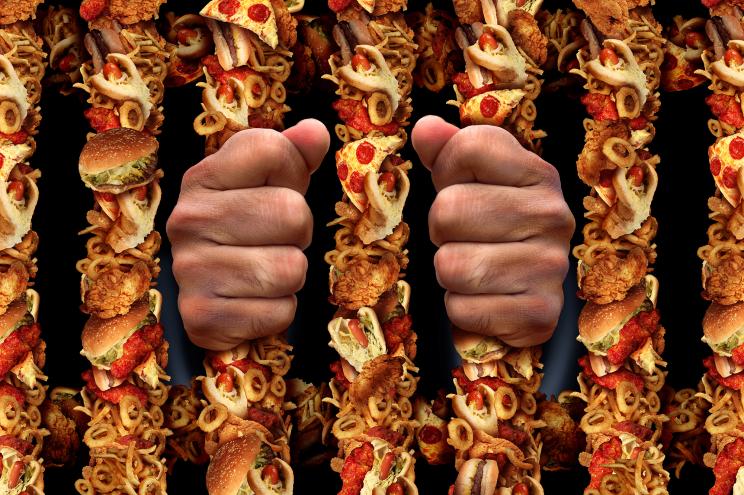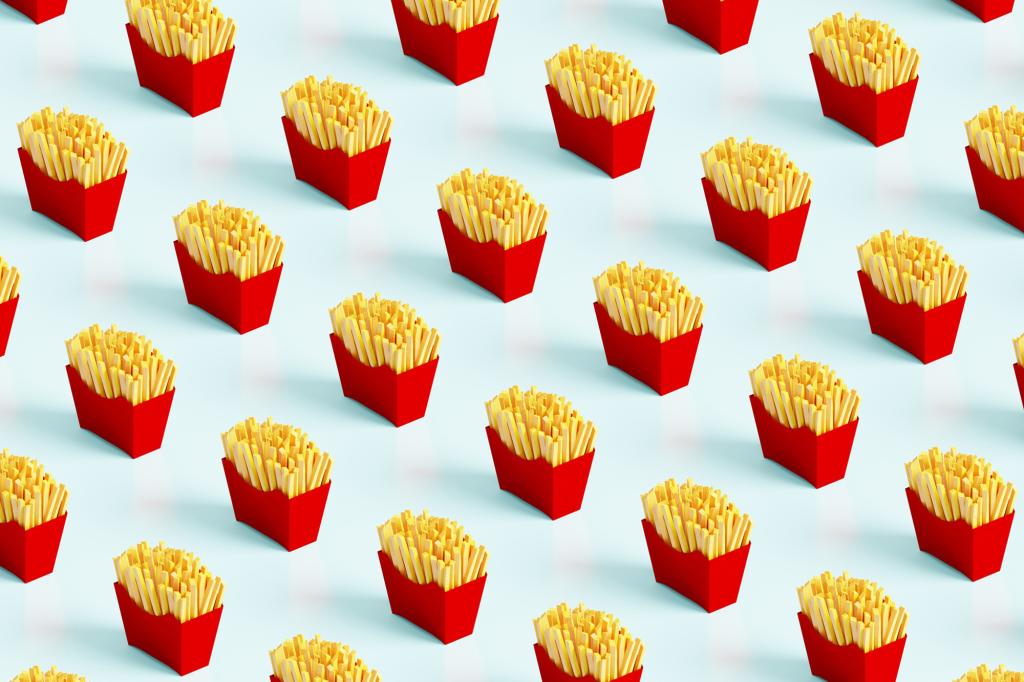Here’s some dangerous food for thought.
With alarming obesity rates on an annual basis, Americans are often accused of being imprisoned by their deadly addictions to fast food and ultra-processed junk.
Now, the month of January inevitably brings along with it an insatiable need to make a new year resolution. However, an estimated 40% of the US population has pledged to do better this time around by eating healthier, according to recent surveys.
But by the end of the first week of 2022, about one-quarter of them will have already dropped the ball on their big fat resolutions.
The Post has followed myriad studies over the years as scientists reveal more of the ways that ultra-processed, high sugar and carb-rich foods are wreaking havoc on our health — by hooking consumers with chemically engineered additives and flavors designed to be irresistible.
More than one-third of American adults — that’s an estimated 36.6% of the US population — scarf down drive-thru goodies on a daily basis, according to the Centers for Disease Control and Prevention.
Its notably addictive qualities have fueled epidemic levels of obesity and other illness linked to poor diet globally, while known to impair immune and hormone function, and ultimately shaving years off one’s life if consumed on a regular basis.
Meanwhile, junk foods have been known to screw with your everyday life, from what goes on in the bedroom to what’s going on in the brain.
So, for those struggling to make good on their promise to eat whole, healthy foods this year, The Post offers an (aggressive) reminder to help you beat the odds — and kick junk foods for good.
COVID-19 craves carbs.
Vegans and vegetarians are missing out, but not for the reasons you’d like to think. Recent research has revealed that plant-based eaters are 73% less likely to come down with the coronavirus compared to those who include animals in their diet. That might be because viruses seem to get a boost from the blood sugar spike caused by some carbs. On the flip side, obesity, type 2 diabetes, high blood pressure and other illnesses associated with poor diet are all “conditions [that] render us susceptible to infectious illnesses — just what we are seeing with COVID-19,” Dr. Nicole Saphier, a radiologist at New York’s Memorial Sloan Kettering Cancer Center and author of “Make America Healthy Again” told The Post last year. Saphier said of COVID-19’s impact on US adults: “I feared that the fact we lead the world in obesity could put us at risk. And, unfortunately, I think the data is showing that suspicion to have been correct.”
The “Western” diet has led to a surge in illness globally.
For years, doctors have wagged their finger at fast food, and the latest research has indicated a very real and worrying correlation between the uptrend of fast food franchises globally and a spike in disease worldwide — not just obesity and heart disease, but more enigmatic autoimmune diseases, too. Francis Crick Institute scientist James Lee told the Observer recently, “Numbers of autoimmune cases began to increase about 40 years ago in the West.” By that time, chain eateries like McDonald’s were already pervasive in English-speaking countries. “However, we are now seeing some emerge in countries that never had such diseases before,” he added, particularly in regions such as Asia and the Middle East, where McD’s didn’t show up until the late 1970s. “Before that they had hardly seen the disease.”
Fast food is an assault on the immune system.
Two chemical preservatives, tert-butylhydroquinone and perfluoroalkyl or polyfluoroalkyl substances, in a group called “forever chemicals,” have been identified in more than 1,200 prepackaged foods in the US — either as a manufacturing ingredient or byproduct of its packaging. There have been studies to suggest that both TBHQ and PFAS may suppress immune function, while PFAS, in particular, are being investigated as a risk factor for cancer, thyroid disease, decreased fertility and low birthweight. Meanwhile, TBHQ has also been linked to a surge in food allergies in recent decades.
Junk food won’t let hormones do their thing.
A study published late last year added further evidence that phthalates, so-called “everywhere chemicals,” are particularly abundant in fast food dishes. This chemical group of “plasticizers” can be found in just about any product on store shelves, from soaps to food and, yes, as its descriptor suggests, in plastics. It’s used to give various materials more pliability — like plastic — and seemingly harmless in low doses. But too much and these chemicals could interfere with hormone activity in humans and animals. Phthalates have been linked to developmental issues in children, and shown to raise their risk of asthma, obesity and fertility problems.
Ultraprocessed snacks are impossible to resist.
Food scientists have devoted decades to making packaged snacks and other highly processed staples taste exactly how we like them, so it’s no wonder why they’re so hard to put down. In 2019, a landmark study found that those on an ultraprocessed diet consumed 508 more calories on average compared to those who emphasize whole and plant-based foods — leading experts to speculate whether these foods are somehow addictive. Researchers don’t know how exactly, but processed foods seemed to encourage more snacking. “There may be something about the textural or sensory properties of the food that made them eat more quickly,” said Kevin Hall, of the National Institute of Diabetes and Digestive and Kidney Diseases. “If you’re eating very quickly, perhaps you’re not giving your gastrointestinal tract enough time to signal to your brain that you’re full. When this happens, you might easily overeat.”
Memory depends on good fats, and it’s erased by bad ones.
Preservative-packed foods “can produce significant and abrupt memory deficits” in seniors, according to a study. Researchers found that these highly chemical-laden snacks, such as chips and fast food, may directly affect your brain’s memory center, as well as the amygdala, which regulates fear and caution, while foods high in omega-3 fatty acids, such as salmon and nuts, can improve memory function.
Sugar is messing with your mind.
A study of some 8,000 adult participants found that men who regularly took in about 67 grams per sugar per day — the same as three to four regular-sized Snickers bars — were 23% more likely to be diagnosed with depression, which may be caused in part by an inflammatory response. Meanwhile, the sweet stuff can also make snackers more anxious and irritable due to blood glucose crashes and their resulting adrenaline boost.
Junk foods stick around — for a scary-long time.
Fast food as it exists today is truly a feat of chemical engineering as multiple experiments have confirmed that some of our favorite items from the “drive-thru” menu could last years on the shelf — and who knows how long in your body. A viral video last summer by TikTok user Elif Kandemir revealed how some common snacks, fast food dishes and frozen meals have survived more that two years in a closet at home — a project reportedly conceived by her foodie mom. “My mum is a nutritionist helping to tackle obesity,” Kandemir captioned one video. “These foods shown here are ultra-processed foods that 80% of the UK consume on a regular basis.”
A poor diet is the anti-aphrodisiac.
Sugar and refined carbs can cause inflammation throughout the body, including your vascular system, according to nutritionist Lisa Davis, author of 2019’s “Clean Eating, Dirty Sex.” She told The Post that this causes capillaries to swell, which reduces the blood flow necessary to activating the libido or even achieving erections. One of the ways junk foods do this is by robbing your body of the nitric oxide it needs to keep blood vessels healthy and unconstricted. “If you don’t have enough of that nitric oxide, you’re going to have a problem with erectile dysfunction,” Davis claimed.
All processed and no produce may cause blindness — yes, really.
In one recent case, a 17-year-old who reported excessive fatigue and rapidly deteriorating vision was the victim of “avoidant-restrictive food intake disorder,” a diagnosis attributed to adults and adolescents who adamantly avoid certain foods, without concern for their own health. Until he finally met with doctors as well as therapists at the age of 14, the teen consumed only sausage, deli meats, white bread and deep-fried potatoes in all forms. Despite their intervention, by 17, he was still deficient in copper and vitamins B12 and D, and had suffered optic-nerve damage as a result. At that point, his eyesight score had plummeted to 20/200, making him “legally blind.”














